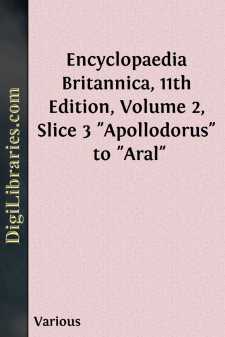Categories
- Antiques & Collectibles 13
- Architecture 36
- Art 48
- Bibles 22
- Biography & Autobiography 813
- Body, Mind & Spirit 141
- Business & Economics 28
- Children's Books 12
- Children's Fiction 9
- Computers 4
- Cooking 94
- Crafts & Hobbies 4
- Drama 346
- Education 46
- Family & Relationships 57
- Fiction 11826
- Games 19
- Gardening 17
- Health & Fitness 34
- History 1377
- House & Home 1
- Humor 147
- Juvenile Fiction 1873
- Juvenile Nonfiction 202
- Language Arts & Disciplines 88
- Law 16
- Literary Collections 686
- Literary Criticism 179
- Mathematics 13
- Medical 41
- Music 40
- Nature 179
- Non-Classifiable 1768
- Performing Arts 7
- Periodicals 1453
- Philosophy 64
- Photography 2
- Poetry 896
- Political Science 203
- Psychology 42
- Reference 154
- Religion 513
- Science 126
- Self-Help 83
- Social Science 81
- Sports & Recreation 34
- Study Aids 3
- Technology & Engineering 59
- Transportation 23
- Travel 463
- True Crime 29
Encyclopaedia Britannica, 11th Edition, Volume 2, Slice 3 "Apollodorus" to "Aral"
by: Various
Categories:
Description:
Excerpt
APOLLODORUS, an Athenian painter, who flourished at the end of the 5th century B.C. He is said to have introduced great improvements in perspective and chiaroscuro. What these were it is impossible to say: perspective cannot have been in his day at an advanced stage. Among his works were an Odysseus, a priest in prayer, and an Ajax struck by lightning.
APOLLODORUS, an Athenian grammarian, pupil of Aristarchus and Panaetius the Stoic, who lived about 140 B.C. He was a prolific and versatile writer. There is extant under his name a treatise on the gods and the heroic age, entitled Βιβλιοθá¼ κη, a valuable authority on ancient mythology. Modern critics are of opinion that, if genuine, it is an abridgment of a larger work by him (Περὶ θεῶν).
Edition, with commentary, by Heyne (1803); text by Wagner (1894) (Mythographi Graeci, vol. i. Teubner series). Amongst other works by him of which only fragments remain, collected in Müller, Fragmenta Historicorum Graecorum, may be mentioned: Χρονικì, a universal history from the fall of Troy to 144 B.C.; Περιîγησις, a gazetteer written in iambics; Περὶ Νεῶν, a work on the Homeric catalogue of ships; and a work on etymology (ÃËτυμολογïαι).
APOLLODORUS, of Carystus in Euboea, one of the most important writers of the New Attic comedy, who flourished at Athens between 300 and 260 B.C. He is to be distinguished from an older Apollodorus of Gela (342-290), also a writer of comedy, a contemporary of Menander. He wrote 47 comedies and obtained the prize five times. Terence borrowed his Hecyra and Phormio from the ÃËκυρì and ÃËπιδικαζÃÅμενος of Apollodorus.
Fragments in Koch, Comicorum Atticorum Fragmenta, ii. (1884); see also Meineke, Historia Critica Comicorum Graecorum (1839).
APOLLODORUS, of Damascus, a famous Greek architect, who flourished during the 2nd century A.D. He was a favourite of Trajan, for whom he constructed the stone bridge over the Danube (A.D. 104-105). He also planned a gymnasium, a college, public baths, the Odeum and the Forum Trajanum, within the city of Rome; and the triumphal arches at Beneventum and Ancona. The Trajan column in the centre of the Forum is celebrated as being the first triumphal monument of the kind. On the accession of Hadrian, whom he had offended by ridiculing his performances as architect and artist, Apollodorus was banished, and, shortly afterwards, being charged with imaginary crimes, put to death (Dio Cassius lxix. 4). He also wrote a treatise on Siege Engines (Πολιορκητικì), which was dedicated to Hadrian.
APOLLONIA, the name of more than thirty cities of antiquity. The most important are the following: (1) An Illyrian city (known as Apollonia κατá¾½ ÃËπïδαμνον or πρὸς ÃËπιδìμνῳ) on the right bank of the Aous, founded by the Corinthians and Corcyraeans. It soon became a place of increasing commercial prosperity, as the most convenient link between Brundusium and northern Greece, and as one of the starting-points of the Via Egnatia....












